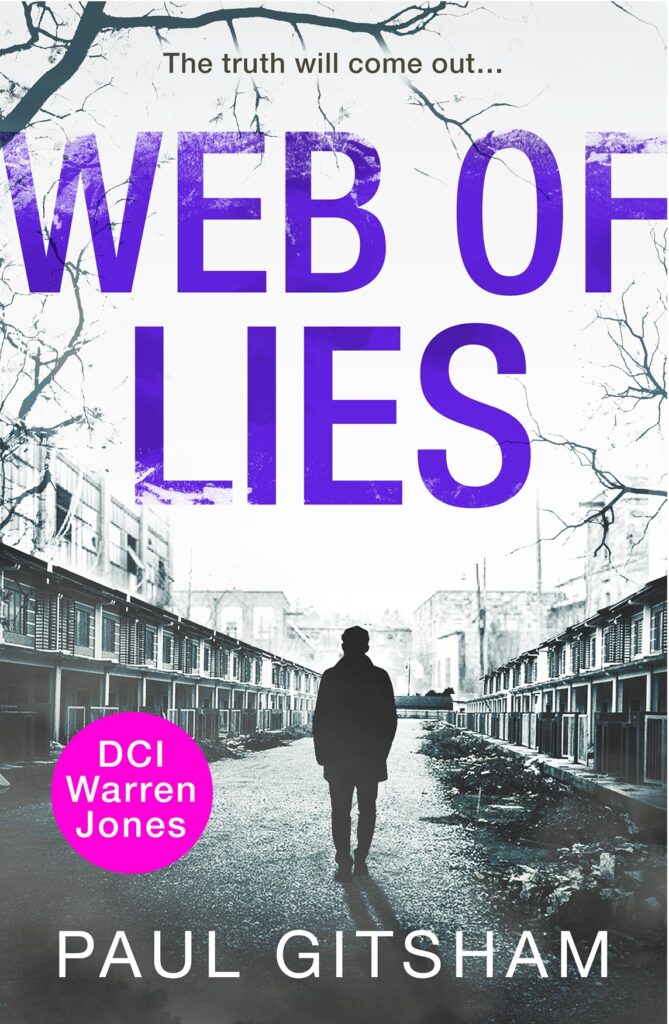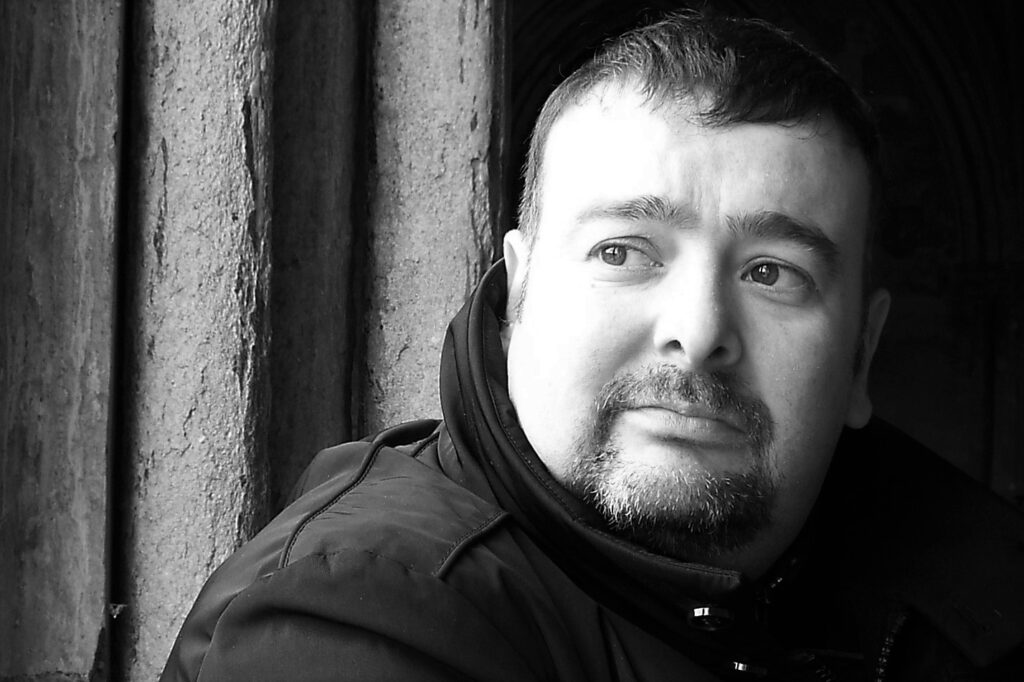

As a child, what did you want to do when you grew up?
Although I always wanted to write, it was really just a fantasy. My main love was science and I studied that at university, before becoming a researcher, then retraining as a science teacher. I still do some online tutoring now.
I’ve always had a little something on the go, but my projects tended towards science fiction and I never finished anything. Yet, I was reading more and more crime and thriller. When a sci fi novel became fixated on a minor subplot that revolved around a murder, I accepted the inevitable and started writing the first DCI Warren Jones, The Last Straw. That was 2011, and the rest, as they say, is history!
How long did it take you to write this book?
Web of Lies is the fastest book I have ever written. It’s the ninth full-length novel in my DCI Warren Jones series, so by now I’m pretty experienced, but this book took me by surprise. I don’t know why, but it just seemed to pour out of me. If I subtract the time I spent working on edits for books that were already coming down the pipeline, it took me about three months to write the first complete draft – less than half the time it usually does. I wish I knew what was so special about this book so I could bottle it and do it again!
Have you ever traveled as research for your book?
My DCI Warren Jones series is set in the fictional town of Middlesbury, North Hertfordshire. This works very well from a story-telling point of view, but I definitely lament the fact that setting it there means I can’t do tax-deductible research trips to exotic locales like some of my writing friends!
That being said, in my fifth book, Forgive Me Father, much of the action takes place in a fictional, ruined medieval abbey. My wife and I love a good cathedral or abbey, so we used it as an excuse to go and visit a few different ones (which I didn’t claim on expenses, if HMRC are reading this!). Middlesbury Abbey is an amalgamation of several real-life places. There is even an embarrassingly crude floor plan and map that I made when planning the story (and no, it won’t ever see the light of day!).
Have you ever killed off a character your readers loved?
Yes. And it was a brilliant decision. There was nothing wrong with the character; they weren’t getting stale or anything. But I had decided a couple of books previously that I really wanted to throw a hand grenade into the room and see what happened. A couple of my favourite authors had done it and I was blown away by the repercussions in later books. It also established that NO ONE in my series is safe, which I feel evokes an air of genuine fear when I place my characters in danger. I hope my readers are thinking ‘you know what, he’s killed off characters before. Will they actually survive this?’
How important was professional editing to your book’s development?
Vital. I can’t overstate how important it is. Whilst I am fortunate that my publisher arranges that side of things, I would urge any independently published writer to accept that it is an unavoidable cost. Proof reading is only the very tip of the iceberg. My editors at HQ Digital give extensive notes on pacing and structure, and tell me if something needs cutting or trimming, or expanding. I’m not exaggerating when I say that my books are immeasurably better after their input. They are still entirely mine – my editors don’t tell me what to write; every word is crafted and chosen by me – but they highlight things I need to consider. They coach me how to write a better book.
What are common traps for new authors?
If you want a career, think about a realistic publishing schedule.
I’m quite open about the fact that I made a mistake when I first started by publishing books too quickly. I already had 2 ½ completed novels when I signed my first three (later four) book deal. I then completed the third book, worked through the editing process for all three books and wrote a short novella. We put all four out in 14 months and it was great!
However, at the time I was still working full-time as a schoolteacher, so when my publishers then asked what else I had, I had nothing left! It was three years before I was in a position to publish again, and in that time I lost much of that early momentum. I still had some loyal readers that returned for The Common Enemy, but many had moved on, and I had to rebuild my readership.
The second thing that beginning authors don’t fully appreciate, is that your writing pace will slow once you have a book accepted for publication. I wrote my first two books back-to-back and dived straight into my third. But suddenly, the edits came back for book one, followed by book two (two or three rounds for each), and I had to design a website, and start building my brand … and suddenly, with the need to work full-time also, a month had passed and I hadn’t written anything new for book three. Being an author is a fully-fledged job, and actually writing new words is only a small part of it.
What would you say to an author who wanted to design their own cover?
Don’t! Unless you are a trained graphic designer, leave it to the professionals. It really is an incredibly skilled job. These folks study industry trends, have an expert eye for picking colour schemes and fonts, and have the skills (and software!) to tweak and adjust artwork so that it looks just right. Your cover is the first thing a potential reader sees and contrary to popular belief, people do judge your book by it.
With some exceptions, a self-designed cover often stands out, and not in a good way. To my eye at least, it often seems slightly ‘off’ and even amateurish, but the effect is so subtle you can’t quite place your finger on what’s wrong. If you are traditionally published, your publisher will work with trusted, experienced design teams. If you are self-published, you can often employ these same people on a freelance basis (sometimes the designer is credited on the book’s jacket). Along with a good editor, it’s an essential investment if you are serious about selling your work.
What characters in your book are most similar to you or to people you know?
I’m not going to lie, Warren Jones comes with a healthy dose of wish fulfilment! We are broadly the same age and both transplants from Coventry. When I was crafting the character, I initially tied myself into all sorts of knots trying to come up with someone completely original that would stand out. But the problem was that there were so many awesome detectives already out there, which I didn’t want to butt heads with. Furthermore, at that early stage in my career, I didn’t feel confident enough to write extensively about someone struggling with alcohol or substance abuse (I suffer from neither, I’m glad to say), a bitter divorce (ditto) or dark demons that keep them awake every night (again, rarely a problem, fortunately). Characters such as Harry Bosch are afficionados of jazz (I prefer cheesy 80s pop) and Kay Scarpetta is an expert cook (I’m a fussy eater).
And so I decided to write about a ‘normal’ man. He’s happily married, and whilst he has some painful incidents in his past, they don’t linger over him. He’s a fussy eater and has an embarrassing taste in music. And you know what? By trying not to write a character that is too unusual and unique, I seem to have written a character that is (within the genre), somewhat unusual and unique! He’s compassionate, very competent and determined to seek justice. But he isn’t a martial arts or computer expert, and he has made mistakes. And sometimes he gets himself into bother by doing things he shouldn’t. But he is honest, incorruptible and very hard-working. And at the end of the day, he comes home to Susan his schoolteacher wife. I save the real darkness for the people he meets. I feel that by making Warren relatable, those he chases appear even more different and memorable.
Would you and your main character get along?
See above! When I set out to write Warren, I decided he should pass what I call the ‘Friday night pint test’. In other words, would you be happy to go for a pint with him down the pub? And that’s a yes for me. I’d happily have a drink or two with Warren and share a packet of cheese and onion crisps, whilst annoying the locals by feeding the jukebox money to keep the Greatest Hits of the 80s compilation album on repeat.
If you were to write a spin-off about a side character, which would you pick?
About four books in, I very briefly introduced a new character, Detective Constable Moray Ruskin. He got a bit more action in the short novella A Deadly Lesson, before becoming a central character from Forgive Me Father onwards. I’ve really enjoyed writing him, and as the series progresses and we learn more about him, he has grown both from my perspective as a writer and as a character. Without giving too much away, he’s a physically imposing, beared Scotsman (he’s six-foot-five and eighteen stones, none of it fat), he’s gay in a committed relationship, and incredibly intelligent. But he’s also young, and we see him learning as time goes on. He still does rash things and makes mistakes. He could definitely carry a series on his own, but if he did it would be a tonally different series to Warren Jones. I would need to move him out of Warren’s orbit to give him space to fully develop. He’s learned a lot from Warren and the team at Middlesbury, but he would be a very different investigator.